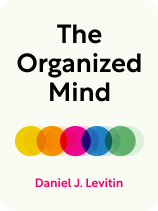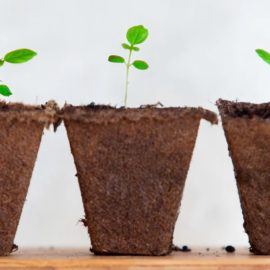

This article is an excerpt from the Shortform book guide to "The Organized Mind" by Daniel J. Levitin. Shortform has the world's best summaries and analyses of books you should be reading.
Like this article? Sign up for a free trial here.
How can we live less stressfully in the modern world, where we have more demands on our attention than ever before? How should we organize information, our physical spaces, and even our relationships?
In his book The Organized Mind, Daniel Levitin explains how our attention and memory work and shows how we can leverage them to make better decisions. He argues that we can give our brains a break by physically or digitally sorting and storing both information and objects.
Keep reading for an overview of this book that can help you feel less overwhelmed and more relaxed and in control.
Overview of The Organized Mind by Daniel Levitin
In The Organized Mind, Daniel Levitin suggests that the key to a less stressful life lies in sorting and externally storing your thoughts and organizing the things around you, which means writing down your thoughts and arranging your physical environment so your brain has less information to manage. Levitin argues that doing so allows you to use your brain power more efficiently and make better decisions.
Levitin, a neuroscientist, garnered national attention with his first book, This Is Your Brain on Music, which spent over a year on several best-seller lists. Since then, he has written four other books—three of which were New York Times bestsellers, including The Organized Mind.
We’ll first explain how the modern world overwhelms us and why Levitin says this is problematic. Then, we’ll describe our current approach to dealing with overwhelm, why it doesn’t work, and why you should sort and externalize your thoughts and things instead. Finally, we’ll discuss strategies for sorting and externalizing your thoughts, things, and relationships so that you can make better decisions.
Our Big Problem: The Modern World Is Overwhelming
Levitin explains that our brain can only process a limited amount of information at once. However, the modern world constantly exposes us to more information than our brains are capable of processing.
This increase in stimuli hampers our ability to make decisions. Levitin explains that, when we’re bombarded by information, we must make decisions all the time, which is tiring. Most of these decisions are unimportant. However, your brain spends the same amount of energy on every decision, no matter how big or small.
Why Our Current Approaches Don’t Work
To improve your decision-making skills? You must first understand what you’re currently doing.
How Attention Works
Levitin explains that we have two modes of attention: “central executive” (CE) mode and “mind-wandering” (MW) mode. CE mode is what you’re using to read this; it takes over when you’re trying to focus on a particular task. If you’re not in CE mode, your brain naturally reverts to MW mode: You’re not focused on anything in particular.
Your brain chooses your mode of attention using two mechanisms: the “attentional filter” and the “attentional switch.” Your attentional filter constantly assesses your environment and guards against unimportant information. If your brain detects something new or something significant, your attentional switch kicks in and directs your attention to something else.
The reality of how attention works explains why multitasking doesn’t work. You may think you’re doing two things at once, but you’re actually alternating your focus between the two demands. This constant shifting takes a serious toll.
How Memory Works
Your brain uses associative access and the altering of memories to recall something. Each time you encounter a stimulus, you encode a representation (a mental concept) of that stimulus in your brain. When you want to recall that stimulus or concept, you can do so via “associative access.”
Associative access works because the representations of these stimuli are all linked to each other in your brain, and recalling one stimulus automatically activates several other representations.
Each time you recall something, you risk unintentionally altering the memory—so, when you remember the same event again later, the memory may no longer be accurate.
As Levitin notes, keeping and processing complicated information in your head is risky. The fact that certain representations are linked to and thus automatically activate other representations can confuse your brain—which may lead you to make poorer decisions.
What to Do Instead: Sort and Store Outside Your Brain
Levitin suggests conserving your mental resources so you have more brain power and energy to deal with the decisions that matter. You can do so via categorization (sorting) and externalization (storing information outside your brain by writing it down).
Sorting Into Categories
Sorting helps you preserve your mental resources by allowing you to focus on only the most salient details at any given moment instead of juggling several bits of information in your head at once.
For example, you could sort your dinnerware by function, color, or situation (e.g., everyday use vs. special occasions).
Storing in the Physical World
Another way to preserve your brain power is to store information in the physical world rather than in your brain. This reduces the amount of information you have to remember.
One effective way to externalize information is by writing down tasks you don’t need to deal with at the moment. By doing so, you free up mental space so that you can focus on the task at hand.
Sorting and Storing Increases Creativity
Levitin asserts that, in addition to helping you keep track of your life, sorting and externalizing information can also improve your creativity for two reasons. First, when you work in a well-organized environment, you know exactly where everything is. As a result, you don’t spend time on the stressful task of searching for things you need and are thus able to reduce your stress levels and save your brain power for creative thinking.
Second, sorting and externalization improve your creativity by allowing you more opportunities to browse. When you look through a collection of some type (such as a group of files), your brain reverts to MW mode. Often, this mind-wandering leads to a creative insight—which might help you solve an issue you’ve been facing.
How to Organize Your Thinking
Now that you understand the importance of sorting and externalizing information, how do you actually do it? Let’s look at that next.
How to Externalize and Sort Distracting Thoughts
Our brains naturally want to wander—which often leads us to think of random but important thoughts at inopportune times. To deal with intrusive thoughts, Levitin recommends using a notecard system to externalize and sort your thoughts to ensure you get to them eventually. To do so, carry a pack of 3 x 5 notecards. Put only one thought on each card so that you can sort them more easily in the second step.
Second, Levitin suggests that you sort these cards daily. If you only have a few cards, you can sort them by priority. But if you have many, sort the cards into categories, then order them by priority within each category.
How to Organize Medical Information Effectively
According to Levitin, one area in which externalizing information is particularly helpful is when making difficult medical decisions. Oftentimes, this requires you to make decisions based on probability. Levitin warns against trying to intuit this decision.
Instead of intuiting probabilities, externalize them using a “fourfold table” for statistically analyzing data, also known as a 2 x 2 contingency table. This allows you to calculate the likelihood of several possible specific outcomes given their base rate. When you write down the relevant numbers, you’re able to see the probabilities, which allows you to rely on calculations rather than incorrect hunches when making medical decisions—and thus allows you to make better decisions.
Levitin clarifies that you should not rely exclusively on your own calculations when making medical decisions. An experienced doctor is often able to seemingly intuit accurate diagnoses and offer good treatment because she’s recognizing something with which she’s familiar.
How to Avoid the Pitfalls of Externalized Information
Levitin warns that externalized information can also have pitfalls. To ensure that externalizing information helps rather than harms you, develop the ability to evaluate that information well. Levitin suggests that you learn to critically evaluate your sources. Pay attention to the legitimacy of the source and whether they might have an ulterior motive. Be especially careful during breaking news events.
Second, Levitin suggests that you learn to critically evaluate data. In particular, Levitin warns against confusing causation and correlation.
How to Organize Your Things
Levitin suggests that you use the power of externalization and sorting to track your things—and thus free up more mental energy to focus on other tasks and make better decisions. Levitin suggests that, when thinking about how to keep track of your stuff, there is a neurological trait—in addition to your brain’s tendency to sort—that you should keep in mind: You are great at remembering where things are.
So, how can you work with your biology to organize your physical objects? Levitin names two strategies.
1) Designate a place for everything. If you have no idea where to put something, or you’re just not sure where it goes yet, Levitin suggests having a junk drawer or a miscellaneous file.
2) Adjust the environment so that it reminds you what to do. This can be built into the organization system you select; for example, you might purchase a silverware organizer that’s labeled with a picture on each slot that denotes which utensils go there. Alternatively, you can temporarily change the environment based on your needs—which will help you remember where something is because your attentional filter will pick up on it. This works only because it’s unusual.
How to Organize Your Digital Information
Just as with real-life spaces, Levitin suggests that you take advantage of your spatial memory when organizing digital information by designating different virtual spaces for specific tasks. You can do so either by purchasing separate devices or by visually altering the same device to trick your brain. For example, you could purchase one computer for work and another for personal tasks, or you could create two separate users on the same computer.
Levitin adds that, if you’re using your computer to track important files, you should sort them by type. This allows you to easily find your file on the computer even if you don’t remember the exact file name. To sort your files, consider what higher-order group each file might fall into, then separate them into folders accordingly. Levitin recommends that you have no more than 30 files in each folder. And when creating these files and folders, think about how you’ll eventually look for them to make these classifications easier.
Levitin suggests that you regularly back up your data to two separate drives. Be wary of using cloud storage.
How to Organize Your Relationships
Levitin suggests that we struggle to keep track of and maintain fulfilling relationships with the people who matter because we know so many people.
Levitin suggests dealing with the increase in social connections in two ways. First, create a database of your connections that includes information you’d like to remember about them. Second, set an external reminder to contact important people in your life, such as by creating a recurring weekly event to “Call Mom.”
Exercise: Implement Levitin’s Strategies Effectively
Levitin suggests that you organize your physical and digital things, your thoughts, and your relationships so that you can use your brain power more efficiently and make better decisions. We’ll help you decide which of these areas to tackle first so that you maximize the reduction in overwhelm that you feel.
- What do you feel most overwhelmed by right now? For example, if you’ve recently moved, you may feel overwhelmed by the number of boxes to unpack or the number of services you still need to register for.
- What state would that overwhelming thing need to be in so that it felt more manageable? For example, unpacking the boxes in your kitchen or signing up for just electricity, internet, and water might significantly reduce your overwhelm.
- What’s a strategy you learned from Levitin that could help you achieve that state? For example, you might designate zones in your kitchen (for plates and bowls) to make unpacking easier, or you might write down all the services you need to sign up for so that you can stop getting distracted and focus on signing up for the most important three.

———End of Preview———
Like what you just read? Read the rest of the world's best book summary and analysis of Daniel J. Levitin's "The Organized Mind" at Shortform.
Here's what you'll find in our full The Organized Mind summary:
- The key to living less stressfully in the modern world
- Why our current approach to dealing with stress doesn’t work
- Strategies for sorting and externalizing your thoughts, things, and relationships






